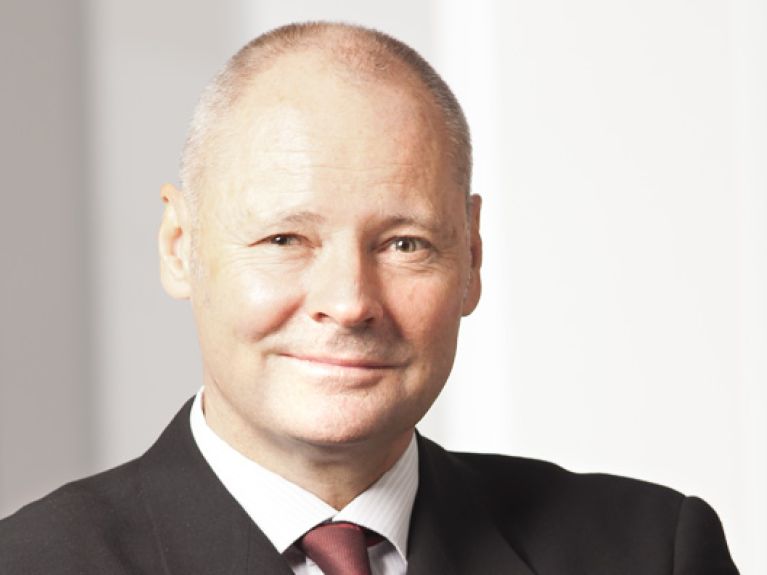Ambassador Michael Klor-Berchtold in Iran
Ambassadors and senior German employees in international organizations present insights into their work in the deutschland.de series “Foreign posting”. Part 26: Michael Klor-Berchtold in Iran

Ever since sanctions against Iran were relaxed in July 2015, the country has been rapidly changing. What do you see as the opportunities, challenges and perhaps risks of this new phase?
In undertaking to use its nuclear programme solely for peaceful purposes in future, Iran has put in place the necessary framework conditions for improving the difficult economic situation of around 75 million Iranians. Ever since the United Nations and the European Union lifted the economic and financial sanctions they had directed at the country’s nuclear programme, Iran has been able to export oil and gas again, and has regained access to its frozen export revenues. This paves the way for further expansion of relations in all areas, including economic and trade relations. Life for Iranians will not change overnight, however. It takes time for the consequences of the over decade-long nuclear dispute to be overcome.
America’s new president Donald Trump has often criticized the nuclear agreement with Iran, whereas Germany is a staunch advocate of the deal. What impact could this have on the future of the agreement, and what does this mean in turn for Germany?
In our view, the agreements are the right ones. And they are having an impact. The International Atomic Energy Agency in Vienna for example has confirmed that Iran is fundamentally keeping to the agreements. Our interest is clear – to work towards ensuring that they remain in force. Furthermore, if trust is to be built up on both sides it is crucial that the Vienna agreement continue to be implemented, without ifs and buts.
Can you give us a brief idea of what characterizes German-Iranian relations today and in the past, and what connects Germany and Iran?
The diplomatic relations between Germany and Iran date back to the late nineteenth century. They were subject to tensions for a time following the Islamic Revolution in 1979, and had been characterized by concerns about Iran’s nuclear programme from 2003. The nuclear agreement has opened the door to closer bilateral relations and regular political consultations, including on regional issues. This presents an opportunity, as we have great interest in maintaining a dialogue with the Iranian government, particularly on difficult topics. The critical situation with respect to human rights and the very large number of executions are things we are watching with considerable concern, for instance.
Since the agreement was signed, Federal Foreign Minister Sigmar Gabriel – at the time in his previous role as economics minister – his predecessor Frank-Walter Steinmeier and Federal Minister of Transport Alexander Dobrindt have each visited Teheran twice. However, numerous state-level ministers have also been there to strengthen the traditionally close economic relations. Recently, the Bavarian Industry Association and the State of Lower Saxony set up their own branch offices there. German exports to Iran also increased significantly last year. And in early 2017 Airbus handed over the first of 100 aeroplanes to Iran Air – an A321 built at the Airbus plant in Hamburg. This also makes an important contribution to improving air traffic safety in Iran and shows that there are high hopes that relations in all areas will take off again.
In which areas would you like to deepen these relations?
There is great interest in cultural exchange on both sides, and it is worthwhile creating even more space for cultural dialogue. That is why for example we are currently supporting the “Iranian Modernity” cultural programme organized by the Goethe-Institut in cooperation with the Literarisches Colloquium Berlin, the CTM Festival, Freie Universität Berlin, Schaubühne Berlin, Hebbel am Ufer and other partners. For a period of three months, Iranian and German philosophers, artists and culture professionals will be giving insights into the Iranian art, music and literary scene in a series of lectures, readings and concerts. Subjects such as the responsibility of religions to promote peace, or the legal culture and legal practice in Germany and Iran, offer potential for increased dialogue and exchange, as well as for debate and understanding.
Which subjects currently define relations between Germany and Iran?
We are doing everything in our power to renew the longstanding German-Iranian relations across the board: on a political and economic level, but also in cultural and societal terms. We want Iran to be a constructive partner. A good starting point is the way in which the prolonged nuclear conflict with Iran was resolved; this could set an example for the efforts currently underway to overcome the crisis in the region.
Often there is a difference between the interior and exterior view of a country. With regard to which areas does this also apply to Iran?
What needs to be done in all areas is rebuild the trust that has been lost and continue to dismantle prejudices. It is therefore very pleasing to see that tourism is growing steadily in both directions. Only if people encounter one another and experience the cultural traditions and cultural landscapes that shape the other country can they obtain a contemporary picture of one another. Iranians and Germans need to get to know each other better again.

